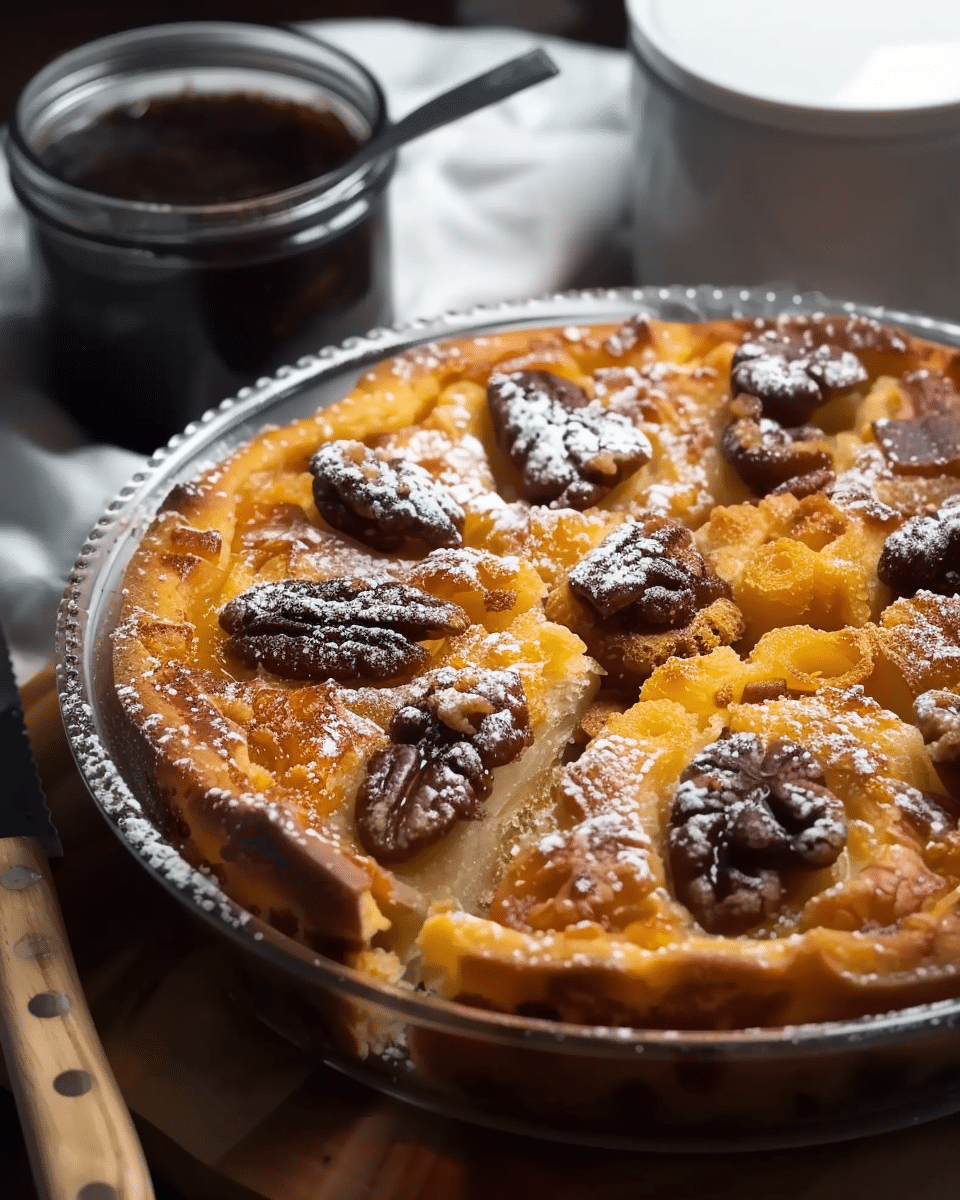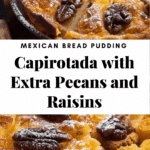This traditional Mexican bread pudding, or "capirotada," beautifully balances sweet and savory flavors with its combination of toasted bread, rich syrup, dried fruit, nuts, and cheese. A beloved dish often served during Lenten season and Easter celebrations, this comforting dessert carries cultural significance while delighting the palate.

Why You'll Love This Recipe
Capirotada offers a unique flavor profile that sets it apart from other bread puddings. The combination of cinnamon-infused syrup, crunchy nuts, chewy raisins, and salty cheese creates a delightful contrast of textures and tastes. This dessert is perfect for special occasions yet simple enough to make any day feel special. It's also adaptable to your preferences—add more nuts or raisins to suit your taste. The warm spices fill your home with an inviting aroma, making the cooking process as enjoyable as the eating.
Ingredients
(Tip: You'll find the full list of ingredients and measurements in the recipe card below.)
Bolillo rolls or baguette form the base of this traditional dessert. These sturdy breads hold their shape while soaking up the sweet syrup, creating the perfect texture balance between soggy and structured. Day-old bread works particularly well.
Unsalted butter adds richness and helps prevent sticking. It also contributes to the caramelization process when toasting the bread.
Ground cinnamon provides the signature warm spice that's essential to capirotada's flavor profile. It infuses the syrup with its aromatic qualities and pairs beautifully with the sweet and savory elements.
Ground nutmeg adds a subtle nutty, sweet undertone that complements the cinnamon without overpowering it. Even a small amount brings warmth and depth to the dish.
Ground cloves contribute a distinctive aromatic quality with their intense, sweet-spicy flavor. They add complexity to the syrup that makes capirotada so memorable.
Kosher salt balances the sweetness and enhances all the flavors. The small pinch makes a big difference in the overall taste profile.
Water serves as the base for the syrup, allowing the sugars and spices to meld together into a cohesive flavor.
Piloncillo or dark brown sugar provides the deep, molasses-like sweetness traditional to capirotada. Piloncillo is unrefined Mexican cane sugar with caramel notes, but dark brown sugar makes an excellent substitute.
Raisins add chewy texture and bursts of concentrated sweetness throughout the pudding. They also plump up beautifully as they absorb the spiced syrup.
Sliced almonds contribute essential crunch and a subtle nutty flavor that contrasts with the soft bread. They also add visual appeal to the finished dish.
Queso anejo or cotija cheese might seem unusual in a dessert, but this salty, crumbly cheese is traditional to capirotada and creates the perfect sweet-savory balance that makes this dish special.
Directions
- Preheat the oven to 400°F (200°C). Grease an 8-inch square baking dish with 2 tablespoons of butter.
- Place a wire rack inside a baking sheet and arrange the bread slices on top. Bake for 15 minutes or until golden and crispy around the edges.
- Reduce the oven temperature to 350°F (175°C).
- In a saucepan, combine the water, piloncillo (or dark brown sugar), cinnamon, cloves, nutmeg, salt, and 2 tablespoons butter. Bring to a simmer and cook for about 10 minutes, or until the syrup thickens slightly. Remove from heat.
- Layer half of the toasted bread slices in the greased baking dish. Ladle some of the syrup over the bread, ensuring it's soaked thoroughly.
- Sprinkle half of the raisins, almonds, and crumbled cheese over the bread.
- Add the remaining bread slices on top, followed by the rest of the nuts, raisins, and cheese. Pour the remaining syrup over the bread to ensure it's fully soaked.
- Bake for 30 minutes or until the capirotada is set but still soft when pressed.
- Let it cool for 10 minutes before serving warm.
Servings and Timing
This recipe yields 6 generous servings, making it perfect for a family dessert or small gathering. The capirotada requires approximately 15 minutes of preparation time and 1 hour of cooking time, for a total of 1 hour and 15 minutes from start to finish. Each serving contains approximately 350 calories, offering a satisfying but not overly indulgent treat.
Variations
Fruit Variations: While raisins are traditional, you can experiment with dried cranberries, chopped dried apricots, or prunes for different flavor profiles.
Nut Substitutions: Replace almonds with chopped pecans, walnuts, or a mix of your favorite nuts for different textures and flavors.
Cheese Options: If you can't find queso anejo or cotija, try mild feta or farmer's cheese for a similar salty contrast.
Added Fruits: Some regions in Mexico add fresh apple or banana slices between the layers for additional moisture and sweetness.
Syrup Additions: Try adding a cinnamon stick, star anise, or a few slices of fresh ginger to the syrup as it simmers for more complex flavor notes.
Chocolate Capirotada: Add ¼ cup of chocolate chips between the layers for a decadent chocolate version.
Storage/Reheating
Refrigeration: Store leftover capirotada in an airtight container in the refrigerator for up to 3 days. The flavors often develop further overnight, making it even more delicious the next day.
Freezing: While possible, freezing isn't ideal as the texture may change. If necessary, freeze in an airtight container for up to 1 month and thaw completely in the refrigerator before reheating.
Reheating: For the best texture, reheat individual portions in the microwave for 30-45 seconds or until just warmed through. You can also reheat the entire dish in a 325°F oven, covered with foil, for about 15-20 minutes.
Serving Cold: Some people enjoy capirotada cold straight from the refrigerator, especially during warmer months.

FAQs
What is capirotada traditionally served for?
Capirotada is traditionally served during the Lenten season in Mexico, particularly on Fridays when Catholics abstain from meat. The dish has symbolic religious significance, with the bread representing the body of Christ and the syrup His blood. Today, it's enjoyed throughout the year but remains especially popular during Easter celebrations.
Can I use regular sandwich bread instead of bolillo or baguette?
While you can use sandwich bread in a pinch, it won't provide the same texture as bolillo rolls or baguette. These sturdier breads hold their shape better when soaked in syrup. If using sandwich bread, toast it well and reduce the amount of syrup slightly to prevent it from becoming too soggy.
What is piloncillo and where can I find it?
Piloncillo is unrefined Mexican cane sugar that comes in small cone shapes with a distinctive molasses-like flavor. You can find it in Latin American markets, international food sections of larger supermarkets, or online. Dark brown sugar makes a good substitute if piloncillo isn't available.
Is the cheese really necessary? It seems odd in a dessert.
The cheese is a traditional and distinctive element of capirotada that creates its unique sweet-savory balance. While you could omit it, the dish would lack the contrast that makes it special. Even those skeptical of cheese in dessert often find they enjoy this combination once they try it.
Why do I need to toast the bread first?
Toasting the bread serves two important purposes: it prevents the bread from becoming too soggy when soaked in syrup, and it adds a caramelized flavor that enriches the final dish. Don't skip this step for the best texture and taste.
Can I make capirotada ahead of time?
Yes, capirotada can be assembled up to a day ahead and refrigerated before baking. You may need to add a few minutes to the baking time if cooking from cold. It also tastes wonderful the day after baking, as the flavors have time to meld.
My capirotada turned out too dry/too soggy. What went wrong?
For dry capirotada, you likely didn't use enough syrup or didn't allow the bread to soak thoroughly. For soggy capirotada, the bread may not have been toasted enough, or you may have used too much syrup. The bread should be saturated but still maintain some structure.
Can I make this recipe dairy-free?
Yes, substitute the butter with a plant-based alternative and omit the cheese or use a dairy-free alternative. While not traditional, the dessert will still be delicious with these modifications.
What's the difference between capirotada and bread pudding?
While both are desserts made with bread soaked in sweet liquid, capirotada is distinguished by its spiced syrup, the addition of cheese, and its layering technique. Traditional bread pudding typically includes eggs and milk, which capirotada does not, and has a more custard-like consistency.
Can I reduce the sugar in this recipe?
You can reduce the sugar somewhat, but remember that the syrup is essential to properly soak and flavor the bread. Consider reducing by no more than ¼ to ⅓ of the total amount to maintain the dish's character and ensure proper moisture.
Conclusion
Capirotada represents the beautiful intersection of culinary tradition and cultural heritage in Mexican cuisine. More than just a bread pudding, it's a dish that tells a story through its unique combination of ingredients and flavors. The contrast between the sweet spiced syrup, crunchy nuts, chewy raisins, and salty cheese creates a memorable dessert experience that has stood the test of time.
Whether you're celebrating Easter, honoring Lenten traditions, or simply looking to explore authentic Mexican desserts, this capirotada recipe offers a window into generations of home cooking. The beauty of this dish lies in its adaptability—adjust the nuts, fruits, or spices to make it your own while respecting its heritage.
As you share this dessert with family and friends, you're participating in a tradition that has brought comfort and joy to countless tables across Mexico and beyond. Enjoy the process of creating this special dish, and savor each bite of its complex, satisfying flavors.

Capirotada with Extra Pecans and Raisins
- Total Time: 1 hour 15 minutes
- Yield: 6 servings
- Diet: Vegetarian
Description
This Mexican bread pudding, or 'capirotada,' is a delightful combination of toasted bread, rich syrup, dried fruit, nuts, and cheese. A perfect dessert for special occasions, particularly around Easter, that will satisfy your sweet and savory cravings.
Ingredients
4 bolillo rolls or a loaf of baguette, sliced into ½ to ¾-inch slices
2 tablespoons unsalted butter
1½ teaspoons ground cinnamon
¼ teaspoon ground nutmeg
¼ teaspoon ground cloves
Pinch of kosher salt
4 cups water
2 cups piloncillo or dark brown sugar
¼ cup raisins
½ cup sliced almonds
3 ounces crumbled queso anejo or cotija cheese
Instructions
- Preheat the oven to 400°F (200°C). Grease an 8-inch square baking dish with 2 tablespoons of butter.
- Place a wire rack inside a baking sheet and arrange the bread slices on top. Bake for 15 minutes or until golden and crispy around the edges.
- Reduce the oven temperature to 350°F (175°C).
- In a saucepan, combine the water, piloncillo (or dark brown sugar), cinnamon, cloves, nutmeg, salt, and 2 tablespoons butter. Bring to a simmer and cook for about 10 minutes, or until the syrup thickens slightly. Remove from heat.
- Layer half of the toasted bread slices in the greased baking dish. Ladle some of the syrup over the bread, ensuring it's soaked thoroughly.
- Sprinkle half of the raisins, almonds, and crumbled cheese over the bread.
- Add the remaining bread slices on top, followed by the rest of the nuts, raisins, and cheese. Pour the remaining syrup over the bread to ensure it's fully soaked.
- Bake for 30 minutes or until the capirotada is set but still soft when pressed.
- Let it cool for 10 minutes before serving warm.
Notes
- This dish is traditionally enjoyed during Lent or Easter in Mexico.
- Feel free to adjust the amount of raisins and almonds to suit your preference.
- Piloncillo can be replaced with dark brown sugar if unavailable.
- This dessert is best enjoyed warm, but leftovers can be reheated or eaten at room temperature.
- Prep Time: 15 minutes
- Cook Time: 1 hour
- Category: Dessert
- Method: Baking
- Cuisine: Mexican
Nutrition
- Serving Size: 1 serving
- Calories: 350 kcal
- Sugar: 25 g
- Sodium: 180 mg
- Fat: 11 g
- Saturated Fat: 5 g
- Unsaturated Fat: 6 g
- Trans Fat: 0 g
- Carbohydrates: 55 g
- Fiber: 2 g
- Protein: 6 g
- Cholesterol: 15 mg





